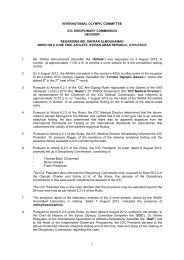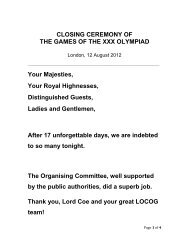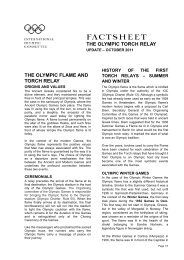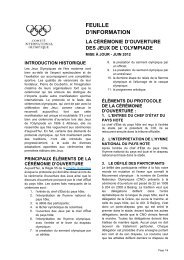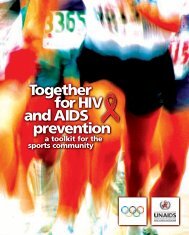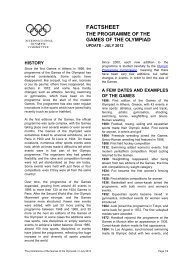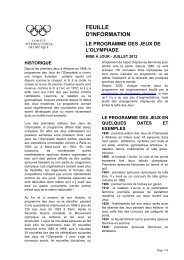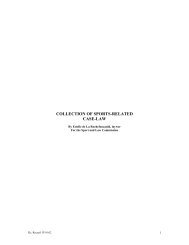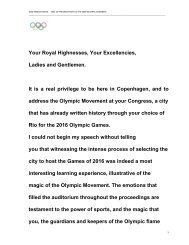8th WORLD CONFERENCE ON SPORT AND THE ENVIRONMENT
8th WORLD CONFERENCE ON SPORT AND THE ENVIRONMENT
8th WORLD CONFERENCE ON SPORT AND THE ENVIRONMENT
You also want an ePaper? Increase the reach of your titles
YUMPU automatically turns print PDFs into web optimized ePapers that Google loves.
<strong>8th</strong> World Conference on Sport and the Environment<br />
International Cooperation and Development Department<br />
Report<br />
Mr Piggot followed up his fi rst question by asking the panel if they felt the sustainability “story”<br />
had been told well enough so far.<br />
Mr Stoch agreed that storytelling is an important part of the process. He pointed to the<br />
Rugby World Cup in 1995 as a useful comparison. The World Cup was held shortly after the<br />
fi rst democratic elections in South Africa and opened important dialogue among citizens on<br />
issues of race and acceptance. Mr Stoch felt that the Games could create a similar dialogue<br />
on sustainability.<br />
Mr Kettlitz felt that the largest obstacle to sustainable storytelling was fi guring out good ways<br />
to incorporate them into marketing plans.<br />
Mr Parker felt that the internet is an untapped, useful resource to further storytelling on<br />
sustainability, which he felt has not reached the appropriate level yet in the Vancouver 2010<br />
context.<br />
A delegate then asked each panellist whether their companies will try to accelerate sustainability<br />
by carefully choosing which sporting events to sponsor?<br />
Mr Kettlitz agreed that Coca-Cola will choose their properties with sustainability in mind.<br />
Mr Parker also agreed that Teck’s choice of event has been determined in part by sustainability,<br />
but also by how much the event will incorporate the local population.<br />
A delegate asked what each panellist’s long-term sustainability goals were post-Games.<br />
Mr Stoch explained that his company will try to engage its workers on their footprint in the<br />
long term.<br />
Mr Parker said that Teck is working with Legacies Now to achieve long-term sustainability<br />
consciousness. Mr Parker advocated all companies to use Legacies Now for this purpose.<br />
Delegate ended the question period by asking how the panel thinks companies can avoid<br />
accusations of “green washing”.<br />
Mr Piggot cited research that indicated companies have been reluctant to share their<br />
sustainability stories in fear of such accusations.<br />
Mr Stoch pointed to VANOC’s licensee audits and codes of conduct as good examples of<br />
how to deal with the green washing issue.<br />
Mr Piggot ended the session by outlining some important lessons, which he identifi ed as:<br />
a) sustainability needs to be a fully integrated aspect of the business plan;<br />
b) sustainability should be aligned with the values and characteristics of the company<br />
(i.e. it should be genuine);<br />
c) employees are particularly engaged on sustainability issues; and<br />
d) as of today, Vancouver 2010’s sustainability story has not been adequately told,<br />
but it is not too late.<br />
4.15. Luncheon Presentation: Passion Drivers for Sport<br />
and Sustainability<br />
Ms Kim Smither,<br />
Managing Director, Octagon Canada, Canada<br />
Ms Smither stressed that the lens through which marketing has been traditionally viewed has shifted.<br />
Previously, advertisers maintained control over the message they sent and consumers were passive<br />
absorbers. However, with technological advances, consumers are more in control of the information<br />
Page 53 / 80





